中考英语英语专题复习之动词
- 格式:docx
- 大小:25.59 KB
- 文档页数:15
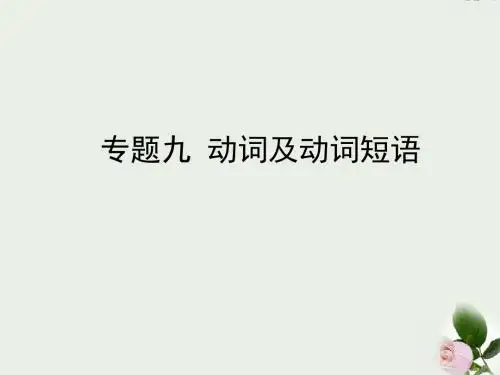
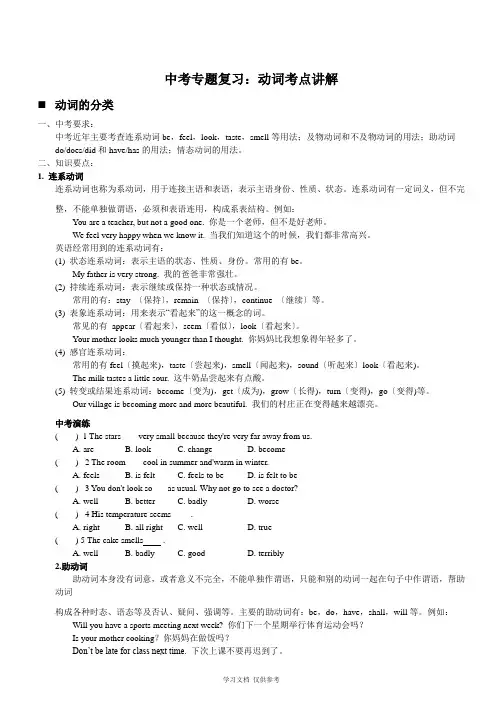
中考专题复习:动词考点讲解动词的分类一、中考要求:中考近年主要考查连系动词be,feel,look,taste,smell等用法;及物动词和不及物动词的用法;助动词do/does/did和have/has的用法;情态动词的用法。
二、知识要点:1. 连系动词连系动词也称为系动词,用于连接主语和表语,表示主语身份、性质、状态。
连系动词有一定词义,但不完整,不能单独做谓语,必须和表语连用,构成系表结构。
例如:You are a teacher, but not a good one. 你是一个老师,但不是好老师。
We feel very happy when we know it. 当我们知道这个的时候,我们都非常高兴。
英语经常用到的连系动词有:(1) 状态连系动词:表示主语的状态、性质、身份。
常用的有be。
My father is very strong. 我的爸爸非常强壮。
(2) 持续连系动词:表示继续或保持一种状态或情况。
常用的有:stay 〔保持〕,remain 〔保持〕,continue 〔继续〕等。
(3) 表象连系动词:用来表示“看起来”的这一概念的词。
常见的有appear〔看起来〕,seem〔看似〕,look〔看起来〕。
Your mother looks much younger than I thought. 你妈妈比我想象得年轻多了。
(4) 感官连系动词:常用的有feel〔摸起来),taste〔尝起来),smell〔闻起来),sound〔听起来〕look〔看起来)。
The milk tastes a little sour. 这牛奶品尝起来有点酸。
(5) 转变或结果连系动词:become〔变为),get〔成为),grow〔长得),turn〔变得),go〔变得)等。
Our village is becoming more and more beautiful. 我们的村庄正在变得越来越漂亮。
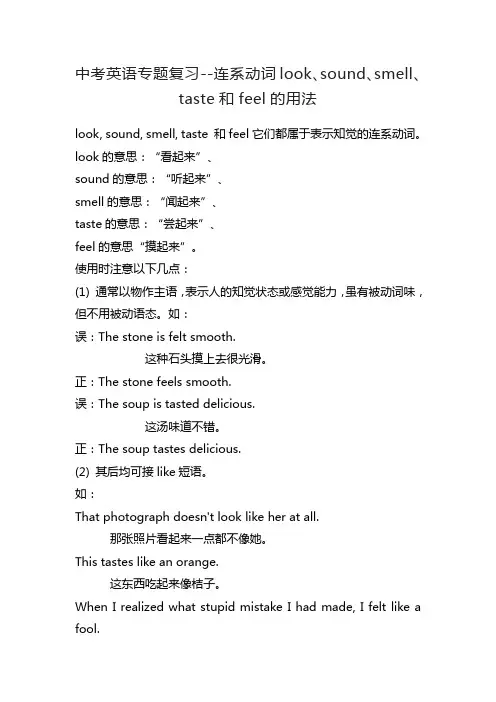
中考英语专题复习--连系动词look、sound、smell、taste和feel的用法look, sound, smell, taste 和feel它们都属于表示知觉的连系动词。
look的意思:“看起来”、sound的意思:“听起来”、smell的意思:“闻起来”、taste的意思:“尝起来”、feel的意思“摸起来”。
使用时注意以下几点:(1) 通常以物作主语,表示人的知觉状态或感觉能力,虽有被动词味,但不用被动语态。
如:误:The stone is felt smooth.这种石头摸上去很光滑。
正:The stone feels smooth.误:The soup is tasted delicious.这汤味道不错。
正:The soup tastes delicious.(2) 其后均可接like短语。
如:That photograph doesn't look like her at all.那张照片看起来一点都不像她。
This tastes like an orange.这东西吃起来像桔子。
When I realized what stupid mistake I had made, I felt like a fool.当我发现我犯了个愚蠢的错误是,我觉得仿佛是个傻子。
(3) 除look外,均不能接to be,也均不用于进行时态(即使是look 也不多见)。
如:She looks (to be) the right person for this job.她似乎是做这项工作的合适人选。
You look / are looking very fetching in that hat with the purple dress.你戴上那顶帽子配上这紫色衣服显得非常动人。
(4) taste和smell常与of连用,意为“有┅的味道”。
如:The room smelt of cigarettes.房间里有烟味。
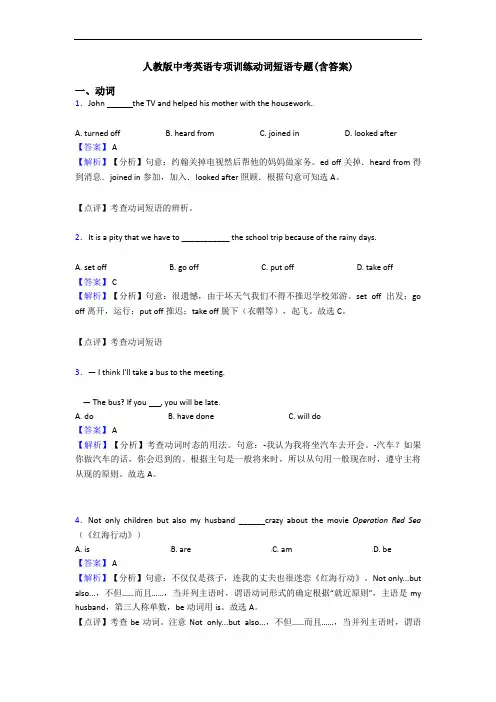
人教版中考英语专项训练动词短语专题(含答案)一、动词1.John the TV and helped his mother with the housework.A. turned offB. heard fromC. joined inD. looked after【答案】 A【解析】【分析】句意:约翰关掉电视然后帮他的妈妈做家务。
ed off关掉.heard from得到消息.joined in参加,加入.looked after照顾.根据句意可知选A。
【点评】考查动词短语的辨析。
2.It is a pity that we have to ___________ the school trip because of the rainy days.A. set offB. go offC. put offD. take off【答案】 C【解析】【分析】句意:很遗憾,由于坏天气我们不得不推迟学校郊游。
set off出发;go off离开,运行;put off推迟;take off脱下(衣帽等),起飞。
故选C。
【点评】考查动词短语3.— I think I'll take a bus to the meeting.— The bus? If you , you will be late.A. doB. have doneC. will do【答案】 A【解析】【分析】考查动词时态的用法。
句意:-我认为我将坐汽车去开会。
-汽车?如果你做汽车的话,你会迟到的。
根据主句是一般将来时,所以从句用一般现在时,遵守主将从现的原则。
故选A。
4.Not only children but also my husband ______crazy about the movie Operation Red Sea (《红海行动》)A. isB. areC. amD. be【答案】 A【解析】【分析】句意:不仅仅是孩子,连我的丈夫也很迷恋《红海行动》。
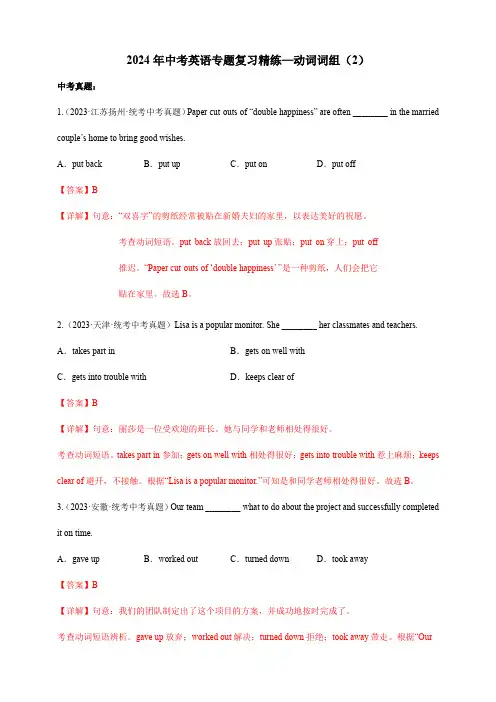
2024年中考英语专题复习精练—动词词组(2)中考真题:1.(2023·江苏扬州·统考中考真题)Paper cut-outs of “double happiness” are often ________ in the married couple’s home to bring good wishes.A.put back B.put up C.put on D.put off【答案】B【详解】句意:“双喜字”的剪纸经常被贴在新婚夫妇的家里,以表达美好的祝愿。
考查动词短语。
put back放回去;put up张贴;put on穿上;put off推迟。
“Paper cut-outs of ‘double happiness’ ”是一种剪纸,人们会把它贴在家里。
故选B。
2.(2023·天津·统考中考真题)Lisa is a popular monitor. She ________ her classmates and teachers. A.takes part in B.gets on well withC.gets into trouble with D.keeps clear of【答案】B【详解】句意:丽莎是一位受欢迎的班长。
她与同学和老师相处得很好。
考查动词短语。
takes part in参加;gets on well with相处得很好;gets into trouble with惹上麻烦;keeps clear of避开,不接触。
根据“Lisa is a popular monitor.”可知是和同学老师相处得很好。
故选B。
3.(2023·安徽·统考中考真题)Our team ________ what to do about the project and successfully completed it on time.A.gave up B.worked out C.turned down D.took away【答案】B【详解】句意:我们的团队制定出了这个项目的方案,并成功地按时完成了。
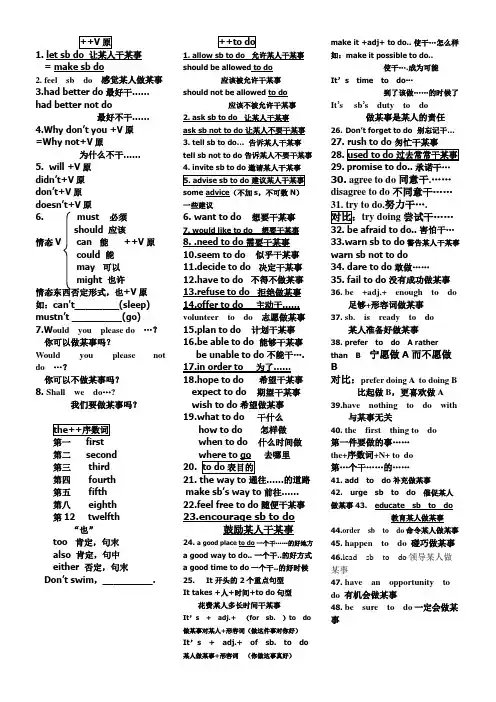
1. let sb do 让某人干某事= make sb do2. feel sb do 感觉某人做某事3.had better do 最好干……had better not do最好不干……4.Why don’t you +V原=Why not+V原为什么不干……5. will +V原didn’t+V原don’t+V原doesn’t+V原6. must 必须should 应该情态V can 能 ++V原could 能may 可以might 也许情态东西否定形式,也+V原如:can't________(sleep) mustn’t _________(go)7.W ould you please do…?你可以做某事吗?Would you please not do…?你可以不做某事吗?8. Shall we do…?我们要做某事吗?第一 first第二 second第三 third第四 fourth第五 fifth第八 eighth第12 twelfth“也”too 肯定,句末also 肯定,句中either 否定,句末Don’t swim,_________. 1. allow sb to do 允许某人干某事should be allowed to do应该被允许干某事should not be allowed to do应该不被允许干某事2. ask sb to do 让某人干某事ask sb not to do 让某人不要干某事3. tell sb to do… 告诉某人干某事tell sb not to do 告诉某人不要干某事4. invite sb to do 邀请某人干某事some advice(不加s,不可数N)一些建议6. want to do 想要干某事7. would like to do 想要干某事8. .need to do 需要干某事10.seem to do 似乎干某事11.decide to do 决定干某事12.have to do 不得不做某事13.refuse to do 拒绝做某事14.offer to do 主动干……volunteer to do 志愿做某事15.plan to do 计划干某事16.be able to do 能够干某事be unable to do 不能干….17.in order to 为了……expect to do 期望干某事wish to do 希望做某事19.what to do 干什么how to do 怎样做when to do 什么时间做去哪里……的道路make sb’s way to 前往……22.feel free to do 随便干某事23.encourage sb to do鼓励某人干某事24. a good place to do 一个干……的好地方a good way to do.. 一个干..的好方式a good time to do一个干..的好时候25. It 开头的 2个重点句型It takes +人+时间+to do句型花费某人多长时间干某事It’s+adj.+(for sb.)to do做某事对某人+形容词(做这件事对你好)It’s+adj.+of sb.to do某人做某事+形容词(你做这事真好)make it +adj+ to do.. 使干…怎么样如:make it possible to do..使干….成为可能It’s time to do…到了该做……的时候了It’s sb’s duty to do做某事是某人的责任26.Don’t forget to do 别忘记干…29.30.agree to do 同意干.……disagree to do 不同意干……努力干….try doing 尝试干……害怕干…33.warn sb to do警告某人干某事warn sb not to do34. dare to do 敢做……35. fail to do 没有成功做某事36. be+adj.+enough to do足够+形容词做某事37. sb.is ready to do某人准备好做某事38. prefer to do A ratherthan B 宁愿做A而不愿做B对比:prefer doing A to doing B比起做B,更喜欢做A39.have nothing to do with与某事无关40. the first thing to do第一件要做的事……the+序数词+N+ to do第…个干……的……41. add to do 补充做某事42.urge sb to do催促某人做某事cate sb to do教育某人做某事44.order sb to do命令某人做某事45. happen to do 碰巧做某事46.lead sb to do领导某人做某事47. have an opportunity todo 有机会做某事48. be sure to do一定会做某事1. be always doing 总是干某事2. be busy doing 忙于干某事 对比 :be busy with sth 忙于某事 3. enjoy doing 喜欢干某事 4. like doing 喜欢干某事 love doing 喜爱干某事 5. feel like doing 想要做…… 6. 对比 would like to do 7. keep doing 一直干某事 (kept 过-kept )keep sb doing 使某人一直做某事8. keep on doing 坚持干某事waste time doing 浪费时间干某事 9.stop/keep/prevent …from doing 阻止某人做某事9. finish doing 完成干某事 10. mind doing 介意干某事don ’t mind+doing 不介意干… can’t stand doing 不能忍受干… can't help doing 情不自禁干……11.… 12.(spend--spent 过-spent )花……干某事.对比:spend …on +N in 可以省略,on 不可以省略 13. have problems (in )+doing ==have difficulties (in )+doing干……有问题havetrouble doing 做某事有困难 12.succeed in doing 成功干某事of ;up 往下;沿着 before 反对;靠着如:be interested in doing 对……感兴趣be good at doing 擅长于干…How about doing ==What about doing干……怎么样?thanks for doing 因…而感谢 Thanks for helping me.谢谢你帮我.=Thanks for your help me.14. to 竟然为介词时,4个不正常的词组如下:期望干某事pay attention to doing 注意干… stick to doing 坚持干某事习惯于干某事used to do 过去常常干某事 15. be willing to do 乐意干某事 16.take up doing 从事干某事 end up doing 以做某事结束 give up doing 放弃做某事 17. avoid doing 避免干某事 18.consider doing 考虑干某事19.be afraid of doing 害怕做某事20. do some cooking/cleaning/ reading/shopping/washing做点饭/打扫一下卫生/读点书/逛逛街/洗洗衣服21. go swimming/fishing/ shopping/skating/boating去游泳/钓鱼/ 逛街/滑冰/划船 22. have fun doing 很开心做某事23. waste time/money doing浪费时间或金钱做某事24. instead of doing 代替做某事对比: instead+句子 25. miss doing 错过做某事 26. hold on to doing 坚持做某事27. suggest doing 建议做某事 28. put off doing 推迟做某事 29. succeed in doing 成功做某事30. prefer doing A to doing BB ,更喜欢做Aprefer to do A ratherthan B 宁愿做A 而不愿做B1.be+adj; stay+adj; keep+adj; feel+adj 。
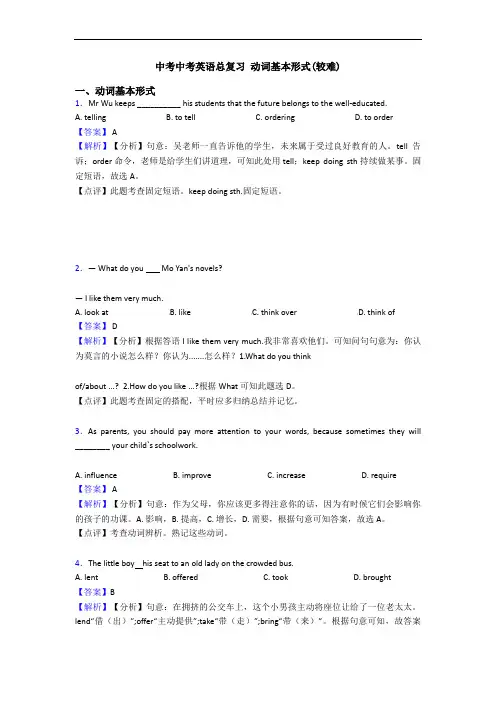
中考中考英语总复习动词基本形式(较难)一、动词基本形式1.Mr Wu keeps __________ his students that the future belongs to the well-educated. A. telling B. to tell C. ordering D. to order【答案】 A【解析】【分析】句意:吴老师一直告诉他的学生,未来属于受过良好教育的人。
tell告诉;order命令,老师是给学生们讲道理,可知此处用tell;keep doing sth持续做某事。
固定短语,故选A。
【点评】此题考查固定短语。
keep doing sth.固定短语。
2.— What do you Mo Yan's novels?— I like them very much.A. look atB. likeC. think overD. think of【答案】 D【解析】【分析】根据答语I like them very much.我非常喜欢他们。
可知问句句意为:你认为莫言的小说怎么样?你认为.......怎么样?1.What do you thinkof/about ...? 2.How do you like ...?根据What 可知此题选D。
【点评】此题考查固定的搭配,平时应多归纳总结并记忆。
3.As parents, you should pay more attention to your words, because sometimes they will ________ your child`s schoolwork.A. influenceB. improveC. increaseD. require【答案】 A【解析】【分析】句意:作为父母,你应该更多得注意你的话,因为有时候它们会影响你的孩子的功课。
A. 影响,B. 提高,C. 增长,D. 需要,根据句意可知答案,故选A。
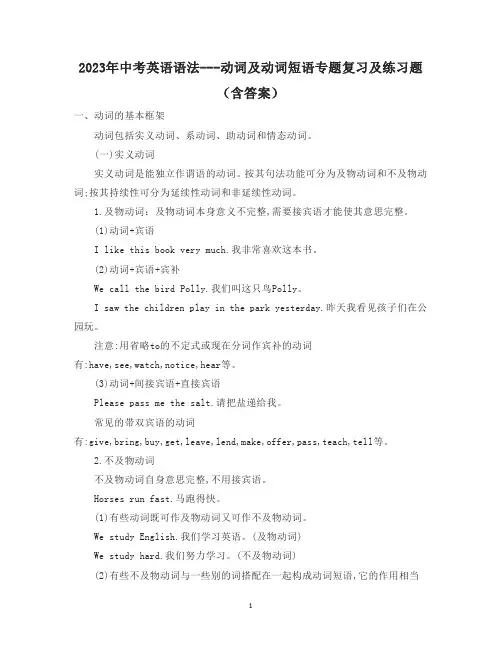
2023年中考英语语法---动词及动词短语专题复习及练习题(含答案)一、动词的基本框架动词包括实义动词、系动词、助动词和情态动词。
(一)实义动词实义动词是能独立作谓语的动词。
按其句法功能可分为及物动词和不及物动词;按其持续性可分为延续性动词和非延续性动词。
1.及物动词:及物动词本身意义不完整,需要接宾语才能使其意思完整。
(1)动词+宾语I like this book very much.我非常喜欢这本书。
(2)动词+宾语+宾补We call the bird Polly.我们叫这只鸟Polly。
I saw the children play in the park yesterday.昨天我看见孩子们在公园玩。
注意:用省略to的不定式或现在分词作宾补的动词有:have,see,watch,notice,hear等。
(3)动词+间接宾语+直接宾语Please pass me the salt.请把盐递给我。
常见的带双宾语的动词有:give,bring,buy,get,leave,lend,make,offer,pass,teach,tell等。
2.不及物动词不及物动词自身意思完整,不用接宾语。
Horses run fast.马跑得快。
(1)有些动词既可作及物动词又可作不及物动词。
We study English.我们学习英语。
(及物动词)We study hard.我们努力学习。
(不及物动词)(2)有些不及物动词与一些别的词搭配在一起构成动词短语,它的作用相当于一个及物动词。
①动词+介词Listen to the teacher carefully.仔细听老师讲。
此类动词短语后面的宾语无论是名词还是代词,都只能放在介词后面,不能放在动词和介词之间。
②动词+副词+介词Let’s go on with our work!让我们继续我们的工作吧!He gets along well with his classmates.他与他的同学们相处得很好。
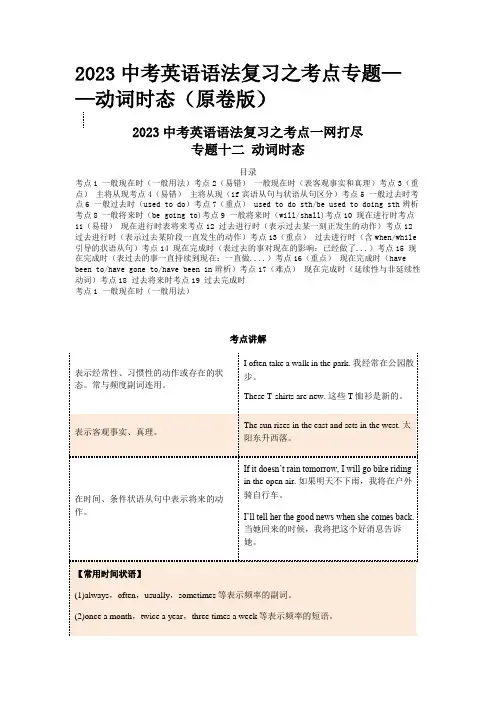
2023中考英语语法复习之考点专题——动词时态(原卷版)2023中考英语语法复习之考点一网打尽专题十二动词时态目录考点1 一般现在时(一般用法)考点2(易错)一般现在时(表客观事实和真理)考点3(重点)主将从现考点4(易错)主将从现(if宾语从句与状语从句区分)考点5 一般过去时考点6 一般过去时(used to do)考点7(重点) used to do sth/be used to doing sth辨析考点8 一般将来时(be going to)考点9 一般将来时(will/shall)考点10 现在进行时考点11(易错)现在进行时表将来考点12 过去进行时(表示过去某一刻正发生的动作)考点12 过去进行时(表示过去某阶段一直发生的动作)考点13(重点)过去进行时(含when/while 引导的状语从句)考点14 现在完成时(表过去的事对现在的影响:已经做了...)考点15 现在完成时(表过去的事一直持续到现在:一直做....)考点16(重点)现在完成时(have been to/have gone to/have been in辨析)考点17(难点)现在完成时(延续性与非延续性动词)考点18 过去将来时考点19 过去完成时考点1 一般现在时(一般用法)考点讲解1.(2021·上海松江·二模)Tim likes watching films. He _________ to the cinema with his girlfriend once a week.A.goes B.is going C.has gone D.will go2.(2020·湖北恩施)I hear that it often ________ in Sichuan and there are usually floods, especially in summer.A.rains B.rained C.will rain3.(2021·北京房山·二模)Mary ________ her grandparents every weekend.A.visits B.was visiting C.is visiting D.has visited4.(2021·广西桂林)The zebra eats grass, but it ________ eat meat.A.doesn’t B.didn’t C.don’t5.(2021·黑龙江·齐齐哈尔市碾子山区教师进修学校一模)—Do you like the flower? —Yes. It ________ sweet.A.is smelling B.smells C.smelt考点2(易错)一般现在时(表客观事实和真理)考点讲解精选练习6.(2020·天津红桥·二模)In the past, people didn't know the earth ________round the sun. A.going B.goes C.will go D.go7.(2021·吉林长春·模拟预测)The teacher told us that the sun ________ in the east. A.rises B.rise C.rose D.rising考点3(重点)主将从现考点讲解精选练习8.(2021·四川乐山)—What’s your plan for the summer holiday?—I’ll go to Chendu as soon as the school term ___________.A.end B.ends C.will end9.(2021·广西河池)Mrs. Green will take her son to the amusement park if she ________ the tickets.A.got B.gets C.is getting D.will get10.(2021·辽宁丹东)We can’t avoid traffic accidents unless everyone ________ the rules. A.follows B.breaks C.will follow D.will break考点4(易错)主将从现(if宾语从句与状语从句区分)考点讲解精选练习11.(2021·辽宁鞍山)—Tina wants to know if you ________ to the park with us tomorrow. —I’d love to. But if it ________, I may go to the library instead.A.go; will rain B.go; rains C.will go; rains D.will go; will rain12.(2020·黑龙江牡丹江)—I wonder if we ________a farewell party next week. —If we________it, I will call you.A.will have ; have B.have;will have C.will have; will have13.(2021·黑龙江哈尔滨)—I wonder if you ________ us for the English party tomorrow. —If I ________ free, I will go with you.A.will join, am B.will join, will be C.join, am考点5 一般过去时考点讲解精选练习14.(2021·广西贵港)—Where does Bill live? —He ________ me his address, but I can’t remember it now.A.tells B.told C.is telling D.will tell15.(2021·四川达州)— Alice has gone out. — Oh, has she? What time ________ she________?A.has; gone B.will; go C.did; go D.is; going16.(2021·江苏徐州)In my school days, I ________ a lot of reading in English every day. That was how I learned English at that time.A.do B.did C.have done D.will do17.(2021·重庆)Last Sunday my brother and I ________ our grandparents.A.will visit B.visits C.visit D.visited18.(2021·内蒙古兴安盟)— Have you ever been to Shanghai? — Of course. Actually, I________ there for six years, but now I live in Beijing.A.worked B.was working C.would work D.have worked考点6 一般过去时(used to do)考点讲解精选练习19.Mr Jiang isn’t as busy as before because there ___________no home robot to help him.A.used to be B.may be C.used to have D.may have20.I ________ in this small mountain village when I was a child.A.use to live B.used to living C.used to live D.used to life21.(2019·江苏镇江)Yao Ming, a basketball giant , ___________ water polo when he was young.A.is playing B.used to play C.is used to playing D.was playing考点7(重点) used to do sth/be used to doing sth辨析考点讲解精选练习22.(2020·湖南益阳)Diana used to _________ to work, but now she is used to ________ because the road is crowded and she wants to keep fit.A.drive; walk B.drive; walking C.driving; walk23.Dick __________ in America, but he has been ___________ Chinese food since he moved to China.A.used to live; used to eating B.is used to live; used to eat C.is used to live; used to eating D.used to living; used to eat24.—How does your brother go to school? —He ___________ ride a bike, but now he__________ there to keep fit.A.used to; is used to walk B.used to; is used for walking C.was used to; is used to walking D.used to; is used to walking考点8 一般将来时(be going to)考点讲解一般将来时表示将来某个时间要发生的动作,事情或存在的状态,也表示将来经常或反复发生的动作或事情。
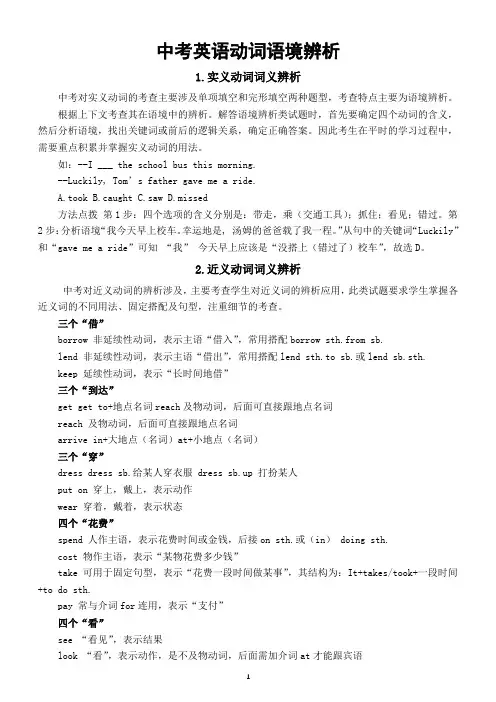
中考英语动词语境辨析1.实义动词词义辨析中考对实义动词的考查主要涉及单项填空和完形填空两种题型,考查特点主要为语境辨析。
根据上下文考查其在语境中的辨析。
解答语境辨析类试题时,首先要确定四个动词的含义,然后分析语境,找出关键词或前后的逻辑关系,确定正确答案。
因此考生在平时的学习过程中,需要重点积累并掌握实义动词的用法。
如:--I ___ the school bus this morning.--Luckily, Tom’s father gave me a ride.A.tookB.caughtC.sawD.missed方法点拨第1步:四个选项的含义分别是:带走,乘(交通工具);抓住;看见;错过。
第2步:分析语境“我今天早上校车。
幸运地是, 汤姆的爸爸载了我一程。
”从句中的关键词“Luckily”和“gave me a ride”可知“我”今天早上应该是“没搭上(错过了)校车”,故选D。
2.近义动词词义辨析中考对近义动词的辨析涉及,主要考查学生对近义词的辨析应用,此类试题要求学生掌握各近义词的不同用法、固定搭配及句型,注重细节的考查。
三个“借”borrow 非延续性动词,表示主语“借入”,常用搭配borrow sth.from sb.lend 非延续性动词,表示主语“借出”,常用搭配lend sth.to sb.或lend sb.sth.keep 延续性动词,表示“长时间地借”三个“到达”get get to+地点名词reach及物动词,后面可直接跟地点名词reach 及物动词,后面可直接跟地点名词arrive in+大地点(名词)at+小地点(名词)三个“穿”dress dress sb.给某人穿衣服 dress sb.up 打扮某人put on 穿上,戴上,表示动作wear 穿着,戴着,表示状态四个“花费”spend 人作主语,表示花费时间或金钱,后接on sth.或(in) doing sth.cost 物作主语,表示“某物花费多少钱”take 可用于固定句型,表示“花费一段时间做某事”,其结构为:It+takes/took+一段时间+to do sth.pay 常与介词for连用,表示“支付”四个“看”see “看见”,表示结果look “看”,表示动作,是不及物动词,后面需加介词at才能跟宾语watch “观看(比赛、电视等)”read “看(书、报等)”,表示阅读四个“说”speak 作及物动词时后接表示语言的名词,表示“说,讲述”say 常跟直接引语或间接引语,表示说的内容talk 是不及物动词,常跟介词to和with,意为“同……谈话”,也表示具有说话能力tell 意为“告诉”,与story连用,意为“讲故事”四个“拿”bring “带来,拿来”,表示拿到靠近说话人的地方take “拿去,带走”,表示拿到远离说话人的地方carry “扛,搬,用力移动”,没有方向fetch “去取,去拿”,表示往返拿东西四个“赢,输”lose 意为“输给”某人,固定搭配为lose to sb.fail 意为“失败”或“未做成某事”beat 意为“打败”,后接人或某支队伍win 意为“赢得,荣誉,地位,比赛等”四个“参加”join 一般指加入“党派”或“组织”并成为其中一员,如参军,入党,入团等join in 指参加竞赛、娱乐、游戏等活动take part in 指参加聚会或群众性活动attend 一般指出席会议、典礼、婚礼等四个“变化”turn 一般用于颜色的变化get 天变黑、变长或变短become 天气变暖或变冷等,表示渐变grow 形状变大或变小3.感官动词词义辨析sound 意为“听起来……”指听觉。
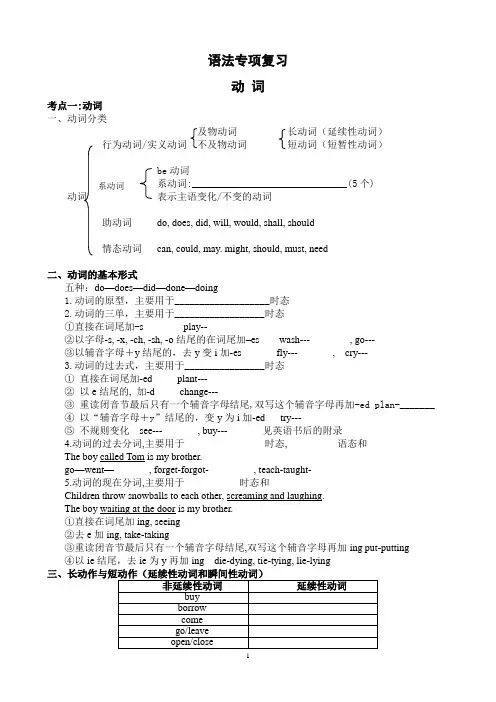
语法专项复习动词考点一:动词一、动词分类及物动词长动词(延续性动词)/实义动词不及物动词短动词(短暂性动词)be动词系动词:_______________________________(5个)表示主语变化/不变的动词do, does, did, will, would, shall, shouldcan, could, may. might, should, must, need二、动词的基本形式五种:do—does—did—done—doing1.动词的原型,主要用于___________________时态2.动词的三单,主要用于__________________时态①直接在词尾加-s play--_________②以字母-s, -x, -ch, -sh, -o结尾的在词尾加–es wash---________, go---_______③以辅音字母+y结尾的,去y变i加-es fly---_______, cry---______3.动词的过去式,主要用于________________时态①直接在词尾加-ed plant---________②以e结尾的, 加-d change---________③重读闭音节最后只有一个辅音字母结尾,双写这个辅音字母再加-ed plan-_______④以“辅音字母+y”结尾的,变y为i加-ed try---________⑤不规则变化see---_______, buy---_______见英语书后的附录4.动词的过去分词,主要用于________________时态,__________语态和_____________The boy called Tom is my brother.go—went—_______, forget-forgot-_________, teach-taught-_________5.动词的现在分词,主要用于___________时态和_____________Children throw snowballs to each other, screaming and laughing.The boy waiting at the door is my brother.①直接在词尾加ing, seeing②去e加ing, take-taking③重读闭音节最后只有一个辅音字母结尾,双写这个辅音字母再加ing put-putting④以ie结尾,去ie为y再加ing die-dying, tie-tying, lie-lyingbegin/startend/finishdiecatch a coldbecome interested inget marriedjoinleavearrive/reach关键是:瞬间动词不能和表达一段时间的状语连用。
九年级 动词Verb在英语中,动词变化形式最多,考题最灵活,所占分值也最大,约占整个卷面的15%左右。
近年来中考的考查重点主要集中在系动词,助动词,动词短语及易混词辨析上。
关于动词的题型也很多变,如完形填空和语法填空、短文填空等。
表示动作或状态的词是动词。
一、动词的基本形式(了解即可) 1、动词原形定义:动词最基本的形式,没有任何变化。
运用:①放在情态动词之后;②放在助动词do, does, did, will, shall 等之后;③放在使役动词 let, make, have 之后作宾语补足语; ④放在to 后面构成动词不定式; ⑤放在祈使句句首; ⑥一般现在时非三单时; 2、动词三单变化规则:①一般情况下只在动词后面加s;②以s, x, sh, ch 结尾的动词,后加es;③以辅音字母加y 结尾的动词,改y 为i ,加es; ④不规则变化:havehas, beis/are/am, gogoes...运用:在一般现在时中,当句子主语是第三人称单数时,谓语动词要用第三人称单数形式。
3、动词过去式变化规则:①一般情况下只在动词后面加ed;②以不发音的e 结尾的,加d;③以辅音字母加y 结尾的动词,改y 为i ,加ed;④以“一个元音字母和一个辅音字母”结尾的重读闭音节动词,先双写末尾一个字母,再加ed;动词原形过去分词⑤不规则变化:havehad, bewas/were, gowent...运用:在一般过去时中,动词原形要改为过去式4、现在分词变化规则:①一般情况下只在动词后面加ing②以不发音的e结尾的,先去掉e,再加ing;③以“一个元音字母和一个辅音字母”结尾的重读闭音节动词,先双写末尾一个字母,再加ing;④以ie结尾的名词,一般将ie改为y,再加ing. 如lie, tie, die运用:现在分词与be动词构成进行时态,现在进行时或过去进行时。
5、过去分词变化规则:过去分词规则变化与过去式相同,动词不规则变化需查不规则变化动词表。
中考英语专项复习专题【动词时代】(附例题以及答案)本章节内容1.动词的基本形式2. 时态的基本框架3.时态判定4.名词在句子中运用1动词的五种基本形式动词主要用来表示动作、状态和性质,而动作和状态的发生有具体的时间和表现方式,这就是英语中动词的时态。
英语中动词的时态由动词的不同形式来表示。
英语动词的五种基本形式为:动词原形、第三人称单数、现在分词、过去式和过去分词。
如:work—works—working—worked—worked。
1.动词的五种基本形式变化表2时态的基本框架常见六种时态的构成及用法(1)一般现在时用法:①现在经常性的状态或动作;②客观事实和真理。
构成:①be+表语;②实义动词作谓语标志词:often, sometimes, usually, always, never,twice a month, every day/week/month/year(every系列)例句:He usually gets to school early.他通常很早到校。
The moon moves around the earth.月亮绕着地球转。
练一练1.认识从实践开始Knowledge practice.2.如果明天下雨,我们就不去公园了。
If it tomorrow,we to the park.【答案】1. begins with.2.rains,won’t go(2)一般过去时用法:表示过去的动作或状态。
构成:①was/were+表语;②实义动词作谓语标志词:a moment ago,just now,ago, yesterday, last night/week/month(last系列)例句:We went to Yunnan last Monday.上周一我们去了云南。
1.She (not visit)her aunt last weekend.2.My friend,Lucy, (study)for the math test and (practice)English last night. 【答案】1.didn’t visit 2.studied practiced(3)一般将来时用法:表示将来的动作或状态。
中考英语动词总结Aaccept vt. 接受,认可一个事实(完)ache vi.& n.痛,疼痛achieve vt. 达到,取得act n. 法令,条例v. (戏)表演,扮演(角色),演出(戏);行动,做事add vt. 添加,增加address n. 地址;v.称呼,传达eg: address a speech; address sb.advise vt. 忠告,劝告,建议afford vt. 负担得起(……的费用);抽得出(时间);提供(完型重点)agree v.同意;应允air n. 空气;大气;v.通风(完)allow vt. 允许,准许answer n.回答,答复;回信;答案v. 回答,答复;回信;(作出)答案appear vi.出现arm n.手臂,支架;v.武装,装备eg: armed with tools, 手中拿着工具arrive vi.到达;达到ask v. 问,询问;请求,要求;邀请avoid v.避免,躲开,逃避Bbear n.熊;v.忍受(doing)生育,养育beat (beat, beaten) v. 敲打;跳动;打赢n.(音乐)节拍(完)become (became, become) v. 变得;成为begin(began,begun)v. 开始,着手believe v.相信,认为borrow v. (向别人)借用;借break (broke, broken) v. 打破(断,碎);损坏,撕开(完)breathe vi. 呼吸bridge n. 桥;v.沟通bring (brought, brought) vt. 拿来,带来,取来brush v.刷;擦n. 刷子build (built, built) v. 建筑;造;逐渐好转,尤指身体好转burn (-ed,-ed 或burnt, burnt) v. 燃,烧,着火;使烧焦;使晒黑busy a.忙(碌)的buy(bought,bought) vt.买Ccall n. 喊,叫;电话,通话v. 称呼;呼唤;喊,叫camp n. (夏令)营vi. 野营;宿营cancel vt. 取消care n. 照料,保护;小心v. 介意……,在乎;关心careless a. 粗心的,漫不经心的carry vt. 拿,搬,带,提,抬,背,抱,运等catch(caught,caught)v.接住;捉住;赶上;染上(疾病)cause n. 原因,起因vt. 促使,引起,使发生celebrate v. 庆祝; 纪念chair n. 椅子;v.掌控(完,引申义)change v. 改变,变化;更换;兑换cheat n. & v. 骗取,哄骗;作弊check n.检查;批改vt. 校对,核对;检查;批改choose (chose, chosen) vt. 选择circle n. 圆圈vt. 将……圈起来clap vi.拍手;鼓掌clean vt.弄干净,擦干净a. 清洁的,干净的clear a. 清晰的;明亮的;清楚的;v.清除(away), 天气放晴(up)climb v. 爬,爬行,攀登close2vt.关,关闭cloud n. 云;云状物;阴影; v. 遮蔽coal n. 煤;煤块coat n. 外套;涂层;表皮;皮毛vt.给……穿外套;涂上1coin n. 硬币;v.杜撰,编造(完,阅读)collect vt.收集,搜集come (came, come) vi.来,来到; 逐渐变化,苏醒;eg: when it comes to doing, 一提到……的时候communicate v. 交际;传达(感情,信息等)compare vt. 比较,对照compete vi. 比赛,竞赛complete a.完成的vt. 完成,结束connect vt. 连接,把……联系起来consider vt. 考虑continue vi. 继续control vt.& n. 控制cook n.炊事员,厨师v. 烹调,做饭copy n. 抄本,副本;一本(份,册 (v)抄写;复印;(计算机用语)拷(备份盘)corner n.角;角落;v. 使陷入困境(绝境)correct v.改正;纠正a. 正确的,对的;恰当的cost (cost, cost) v. 值(多少钱);花费cough n.& vi. 咳嗽count vt.数,点数;……要紧,重要;认为(完,阅读重点)cover n. 盖子;罩v. 覆盖,遮盖;掩盖create vt.创造;造成cry n. 叫喊;哭声v. 喊叫;哭cut (cut, cut) v. 切,剪,削,割n . 伤口Ddeal v. 对付,应付,处理decide v. 决定;下决心depend vi.依靠,依赖,指望;取决于describe vt.描写,叙述develop v.(使)发展;(使)发达;(使)发育;开发vt. 冲洗(照片)die v. 死dig (dug, dug) v. 挖(洞、沟等);掘direct a.直接的;直达的;直截了当的vt.指挥;指导;管理;指挥(演奏);导演(电影)discover vt. 发现discuss vt.讨论,议论dismiss vt. 让……离开;遣散;解散;解雇disturb vt. 扰乱;打扰divide vt. 分,划分doubt n. & v.怀疑,疑惑draw (drew, drawn) v.绘画;绘制;拉,拖;提取(金钱);吸引,dream (dreamt, dreamt 或-ed, -ed ) n.& vt.梦,梦想dress n. 女服,连衣裙;(统指)服装;童装v.穿衣;穿着drink(drank,drunk)v.喝,饮drive(drove,driven) v.驾驶,开(车);驱赶drop n. 滴v.掉下,落下;投递;放弃dry v. 使……干;弄干;擦干a. 干的;干燥的Eeasy a.容易的,不费力的;v. 减轻痛苦或紧张;使简单舒适eat (ate, eaten) v.吃encourage vt.鼓励end n. 末尾;终点;结束v. 结束,终止enjoy vt. 欣赏;享受……之乐趣;喜欢enough n. 足够;充足a.足够的;充分的ad.足够地;充分地enter vt.进入examine vt. 检查;诊察excite vt. 使兴奋,使激动excuse n. 借口;辩解vt. 原谅;宽恕exercise n. 锻炼,做操;练习,习题vi. 锻炼expect vt. 预料;盼望;认为explain vt. 解释,说明express vt. 表达;表示;表情n.快车,特快专递eye n.眼睛; v. to see, to watchFface n. 脸vt. 面向;面对fail v. 失败;不及格;衰退2fall (fell, fallen) vi. 落(下),降落;倒fear v.n. 害怕;恐惧;担忧feed (fed, fed) vt.喂(养);饲(养)feel (felt, felt) v.& link感觉,觉得;摸,触fetch vt. (去)取(物)来,(去)带(人)来fight n.打仗(架),争论fight (fought, fought) v.打仗(架),与……打仗(架)fill vt. 填空,装满film n.电影;影片;胶卷vt.拍摄,把……拍成电影find (found, found) vt. 找到,发现,感到finish v. 结束;做完fire n. 火;火炉;火灾vi.开火,开(枪,炮等),射击fish n. 鱼;鱼肉vi. 钓鱼;捕鱼fit a. 健康的, 适合的v. (使)适合,安装fix vt.修理;安装;确定,决定fly (flew, flown) vi.(鸟、飞机)飞;(人乘飞机)飞行;(旗子等)飘动vt. 空运(乘客,货物等);放(风筝、飞机模型等)follow vt.跟随;仿效;跟得上force vt.强迫,迫使forget (forgot, forgotten) v.忘记;忘掉form n. 表格;形式;结构;v. 形成freeze (froze, frozen) vi.结冰Gget (got , got) vt. 成为;得到;具有;到达give (gave, given) vt. 给;递给;付出;给予go (went, gone) vi. 去;走;驶;通到;到达grasp v.抓住;紧握grow (grew, grown) v. 生长;发育;种植;变成guard n. 防护装置,警戒guess vi.猜Hhand n. 手;指针v. 递;给;交付交上;交进hang(hanged,hanged)v.处(人)绞刑;上吊hang (hung, hung) v. 悬挂,吊着;把……吊起happen vi.(偶然)发生;to do, 碰巧hate vt.& n.恨,讨厌have (had, had) vt. 有;吃;喝;进行;经受head n.头;头脑(像);才智;首脑;源头;标题a. 头部的;主要的;首席的v.率领;加标题;用头顶;出发;(船等)驶向heap n.堆v. 堆起来hear (heard, heard) v. 听见;听说,得知heat n. 热vt.把……加热help n. & vt. 帮助,帮忙hide (hid, hidden) v. 把……藏起来,隐藏hit (hit, hit) n.& vt. 打,撞,击中hold (held, held) vt.拿;抱;握住;举行;进行honour (美honor) n. 荣誉,光荣vt. 尊敬,给予荣誉hope n.& v. 希望hurry vi.赶快;急忙hurt (hurt, hurt) vt.伤害,受伤;伤人感情Iimagine vt.想像,设想improve vt.改进,更新include vt.包含,包括increase v. & n.增加,繁殖influence n.& v.影响insist vi.坚持;坚决认为intend vt. 想要,打算interview n.& vt. 采访,会见,面试introduce vt. 介绍invent vt.发明,创造invite vt.邀请,招待iron n. 铁,熨斗vt. 熨烫Jjoin v. 参加,加入;连接;会合3Kkeep (kept, kept) v.保持;保存;继续不断vt.培育,饲养kick v.& n.踢kill v. 杀死,弄死kiss n.& vt.吻,亲吻knock n.& v.敲;打;击know(knew,known) v. 知道,了解;认识;懂得Lland n. 陆地;土地v. 登岸(陆);降落last2v.持续laugh n.& v.笑,大笑;嘲笑lay (laid, laid) vt. 放,搁lead (led, led) v. 领导,带领learn (learnt, learnt;-ed -ed) vt.学,学习,学会leave (left, left) v. 离开;把……留下,剩下lend (lent, lent) vt.借(出),把……借给let (let, let) vt.让lie1n.& vi.谎言; 说谎lie2 (lay, lain) v. 躺;卧;平放;位于lift1v. 举起,抬起;(云、烟等)消散light n. 光,光亮;灯,灯光vt.点(火),点燃a. 明亮的;轻的;浅色的like2vt.喜欢,喜爱line n. 绳索,线,排,行,线路v.画线于,(使)成行listen vi. 听,仔细听litter v. 乱丢杂物live1vi.生活;居住;活着lock n. 锁vt. 锁,锁上long a. 长的,远ad. 长久;v.渴望look n. 看,瞧v. 看,观看v. link 看起来lose (lost, lost) vt. 失去,丢失Mmail n. 邮政,邮递v.(美)邮寄make (made,made)vt.制造,做;使得manage v.管理;设法对付mark n.标记vt. 标明,作记号于market n. 市场,集市marry v. (使)成婚,结婚master vt.精通,掌握match1vt. 使相配,使成对mean(meant,meant)vt. 意思是,意指meet (met, met) vt. 遇见,见到n. 会;集会,满足需求要求mend v. 修理,修补mention n. 提及;记载vt. 提到,说起;提名表扬mind1n. 思想,想法mind2v. 介意,关心miss vt.失去,错过,缺mistake (mistook, mistaken) n. 错误vt.弄错monitor n. (班级内的)班长;监视器;v.监测move v. 移动,搬动,搬家murder vt. 谋杀Nname n. 名字,姓名,名称vt.命名,名叫nod vi. 点头note n. 便条,笔记,注释;钞票,纸币;音符,音调vt. 记下,记录;注意,留意notice n. 布告,通告;注意vt.注意,注意到nurse n. 护士;保育员;v.照顾Oobject n. 物,物体;宾语;v.反对tooffer n.& vt.提供;建议open a. 开着的,开口的vt. 开,打开order2vt. 定购,定货;点菜own a. 自己的v.拥有,所有Ppaint n. 油漆vt.油漆,粉刷,绘画pardon n. 原谅,宽恕,对不起park vt. 停放(汽车)4part n. 部分;成分;角色;部件;零件a. 局部的;部分的v. 分离;分开;分割pass vt. 传,递;经过;通过passage n. (文章等的)一节,一段;通道;pay (paid, paid) v. 付钱,给……报酬n. 工资pick v.拾起,采集;挑选picture v. 勾勒出,想象出plan n.& v. 计划,打算plant vt.种植,播种n. 植物play v. 玩;打(球);游戏;播放n. 玩耍,戏剧please v. 请;使人高兴,使人满意point v. 指,指向n. 点;分数pop = popular a. (口语) (音乐、艺术等)大post n. 邮政,邮寄,邮件v. 投寄;邮寄practise(美practise) v.练习,实践praise n.& vt .赞扬,表扬prepare vt.准备, 预备;调制,配制present n. 礼物,赠品;v. 呈送,展示prevent vt. 防止, 预防print vt.印刷produce vt.生产;制造pronounce vt. 发音protect vt.保护prove vt.证明provide vt.提供pull v. 拉,拖n. 拉力,引力punish v. 惩罚,处罚push n.& v. 推put (put, put) vt. 放,摆Qquestion vt. 询问n. 问题quiet a. 安静的;寂静的;v.使安静Rraise vt. 使升高;饲养reach v. 到达,伸手(脚等)够到read (read, read) v. 读;朗读realise (美realize) vt.认识到,实现reason vi. 评理;劝说n. 理由,原因receive v.收到,得到recite v.背诵record v. 录制,记录refuse vi. 拒绝,不愿regard v. 把……看作regret n.& vt.可惜,遗憾;痛惜;哀悼relax v.(使)放松,轻松remain vt. 余下,留下vi. 保持,仍是remember v. 记得,想起repair n.& vt. 修理;修补repeat vt. 重说,重做reply n.v. 回答,答复report n.& v.报道,报告require vt.需求;要求research n.研究,调查rest n. 休息;剩余的部分,其余的人(物)vi.休息,歇息retell vt.重讲,重复,复述return v. 归还review vt. 重新调查;回顾;复习n. 复查;复习;评论ride (rode, ridden) v. 骑(马、自行车);乘车n. 乘车旅行ring1 (rang, rung) v.(钟、铃等)响;打电话n. 电话,铃声rise (rose, risen) vi. 上升,上涨risk n.v.风险,row v.划船rule n.规则,规定;v. 统治,管理run (ran, run) vi. 跑,奔跑;vt.运行,管理,经营;表思绪混乱;eg: everything is running in my mind.rush vi. 冲,奔跑Ssail n. 航行v.航行,开航sale n.卖,出售satisfy vt. 满足,使满意save vt. 救,挽救,节省say (said, said) vt. 说,讲score n.& v. 得分,分数screen n.幕,荧光屏5search n.& v.搜寻,搜查seat n. 座位,座; v. 使坐下来see (saw, seen) vt. 看见,看到;领会;拜会seem v. 似乎,好像sell (sold, sold) v. 卖,售send (sent, sent) v.打发,派遣;送,邮寄sense n. 感觉,意识;v. 感知sentence n. 句子;vt.宣判separate v.使分开,使分离a. 单独的,分开的serve vt.招待(顾客等),服务;上菜,起到…..作用set n. 装备,设备vt.设置(布景,背景)set (set, set) vt. 释放,安置shake (shook, shaken) v.(使)动摇,震动shame n. 遗憾的事;羞愧v.使羞愧shape n.形状,外形v. 使成型,制造,塑造share vt. 分享,共同使用shine (shone, shone 或-d, -d) v. 发光;照耀;杰出;擦亮ship n. 船,轮船vi. 用船装运shop vi. 买东西n.商店,车间shoulder n. 肩膀;(道路的)路肩;vt.承担shout n.& v.喊,高声呼喊show (showed, shown 或showed) v.给……看,出示,显示shower n. 阵雨;v.n淋浴shut (shut, shut) v. n. 关上,封闭;禁闭;shy a. 害羞的;v.远离sing (sang, sung) v.唱,唱歌sit (sat, sat) vi.坐skate vi.溜冰,滑冰sleep (slept, slept) vi.睡觉smell (smelt, smelt 或-ed, -ed) v.嗅,闻到;发气味smile n.& v.微笑smoke n. 烟v. 冒烟;吸烟snake n. 蛇v.蛇般爬行;蜿蜒行进snow n.雪vi.下雪sort vt.把……分类,拣选n. 种类,类别sound vi. 听起来;发出声音n.声音spare a. 空闲的,多余的,剩余的;vt.节省,留给speak (spoke, spoken) v. 说,讲;谈话;发言speed n. 速度v.(使)加速spell vt.拼写spend (spent, spent) v.度过;花费(钱、时间等)spread v.延伸;展开stand (stood, stood) v. 站;立;起立;start v.开始,着手;出发state v.陈述,说明stay n.& vi.停留,逗留,呆steal (stole, stolen) vt. 偷, 窃取step n. 脚步,台阶,梯级vi. 走;跨步stick (stuck, stuck) vi. 粘住,钉住;坚持n.木棒(棍),枝条stop n. 停;(停车)站v.停,停止,阻止store n.商店vt.储藏,存储storm n. 风暴,暴(风)雨;vt….骤然而至stream n. 小河;溪流;v.泪奔study v. 学习;研究n. 书房succeed vi.成功suggest vt. 建议,提议supply vt.& n. 供给,供应suppose vt. 猜想,假定,料想surprise vt. 使惊奇,使诧异n. 惊奇,诧异sweep(swept,swept)v. 扫除,扫swim (swam, swum) vi.游泳,游swing vt.挥舞,摆动n. 秋千Ttail n. (动物的)尾巴;vt. 切断,剪切take (took, taken) vt. 拿;拿走;做;服用;乘坐;花费talk n.& v. 谈话,讲话,演讲;交谈teach(taught,taught) v.教书,教telephone v. 打电话n. 电话tell (told, told) vt.告诉;讲述;吩咐;区分,判断6test vt.& n. 测试, 考查,试验thank vt.感谢,致谢,道谢n. (复)感谢,谢意think(thought, thought) v. 想;认为;考虑throw (threw,thrown)v. 投,掷,扔tidy a. 整洁的,干净的vt.弄整洁,弄干净tie vt. (用绳,线)系,拴,扎n. 领带,绳子,结;关系time n.时间;时期;钟点;次,回vt. 测定……的时间,记录……的时间touch vt.触摸,接触tower n.塔;vt. 耸立trade n. 贸易vt.用……进行交换train n.火车v. 培训,训练translate vt. 翻译travel n.& vi.旅行treasure n. 金银财宝;财富;vt.珍惜,珍视trip n. 旅行,旅程;v.over 绊倒trouble vt.使苦恼,使忧虑,使麻烦n.问题,疾病,烦恼,麻烦trust vt.相信,信任,信赖try v.试,试图,努力turn v. 旋转,翻转,转变,转弯n. 轮流,(轮流的)顺序Uunderstand (understood, understood) v. 懂得;明白;理解use n.& vt.利用,使用,应用Vvalue n. 价值,益处;v. 重视visit n.& vt.参观,访问,拜访voice n.说话声; 语态;v. 畅所欲言Wwait vi.等,等候wake (woke, woken) v. 醒,醒来,叫醒walk n.& v.步行;散步want vt. 想,想要;需要,必要warn vt.警告,预先通知wash n. 洗(涤);冲洗;洗剂;泼溅;洗的衣服v. 洗(涤);冲洗;流过;弄湿waste n.& vt. 浪费watch vt.观看,注视;当心,注意n. 手表,表water n.水v.浇水wear (wore, worn) v. 穿,戴weigh vt. 称……的重量,重(若干)welcome int.n. & v.欢迎a. 受欢迎的win (won, won) n. 获胜,赢得wind n. 风wind(wound,wound) vt.缠绕,连带;蜿蜒,弯曲wish n.愿望,祝愿vt.希望,想要,祝愿wonder v.对……疑惑,感到惊奇,想知道n. 惊讶,惊叹;奇迹work n. 工作,劳动,事情vi. 工作;(机器、器官等)运转,活动worry n.& v. 烦恼,担忧,发怒;困扰wound vt. 伤,伤害n.创伤,伤口write (wrote, writ ten) v.写, 书写;写作,著述7。
英语中考归纳复习专题:动词的时态【动词的时态】初中阶段学习的时态有以下八种:一般现在时、一般过去时、一般将来时、现在进行时、过去进行时、现在完成时、过去完成时、过去将来时.前六种为常考时态,要掌握各时态的构成、用法以及标志性时间状语.【一般现在时】【考点训练1】1.My father is a teacher and he _________ (teach) in a middle school.2.Yesterday the teacher told us the earth _______ (go) around the sun.3.—When shall we begin our meeting?—We’ll begin it when Helen ___ . ()esB.cameC.will comee4.—How do you usually go to school?—I usually ___ to school on foot. ()A.goB.wentC.was goingD.will go答案:teaches goes A A【一般过去时】要点提醒:“used to+动词原形”表示过去的习惯或状态.如:Mum used to tell us stories.妈妈过去常给我们讲故事.【考点训练2】1.Mike ________ (not go) to bed until 12 o’clock last night.2.He asked if I _____ (be) a student.3.Will you please say it again?I ___ quite ___ you.()A.don’t;hearB.didn’t;hearC.don’t;heardD.didn’t;heard4.He _____ go out with his parents,but now he ____ staying at home alone. ()ed to;is used toB.is used to;used toe to;is used toed to;used to答案:didn’t go was B A【一般将来时】要点提醒:be going to与will的区别1.be going to 指已计划好的事或思考过的意图、打算,will表示未事先思考或未计划而临时做出的决定.如:I’m going to see him tomorrow.我打算明天去看他.(事先经过思考)I’ll answer the door.我去开门.(未经事先考虑)2.be going to可表示客观迹象表明马上要发生的事,而will则表明说话者的主观意愿.如:Look at the clouds.There is going to be a storm.看看这些云,暴风雨就要来了.(客观迹象表明要发生)I hope it will be warm tomorrow.我希望明天会暖和起来.(主观意愿)3.在含有条件状语从句的复合句的主句中,一般用will,不用be going to. 如:I will come if it doesn’t rain.如果不下雨的话,我就来.【考点训练3】1.____ a concert in our school next Saturday. ()A.There isB.There areC.There will beD.There will have2.If they can arrive by 9:00 am,we ___ a meeting.()A.haveB.will haveC.hadD.would have3.He ___ her a beautiful hat on her next birthday.()A.givesB.gaveC.will givingD.is going to give答案:C B D 【现在进行时】【考点训练4】1.They ____________ (have) a math test in the classroom now.2.Look! He ___________ (lie) on the beach.3.—Pass the raincoat to me.It ___ hard now.—Here you are. ()A.rainB.is rainingC.rainedD.will rain4.—Cathy,can you answer the door?I ___ the room.—I’m coming,Mum. ()A.CleanB.cleanedC.have cleanedD.am cleaning答案:are having is lying B D【过去进行时】He was forever com plaining about something.他老是怨这怨那.要点提醒:1.在含有时间状语从句的复合句中,延续时间较长的动作常用过去进行时,另一个短暂性动作用一般过去时.如:When the UFO landed,I was shopping at the clothes store.当UFO落地时,我正在服装店买衣服.2.表示两个延续性动作在过去某一时刻同时进行,不考虑动作的先后顺序,主句和从句的谓语动词都用过去进行时,连词常用while.如:Tom was doing his homework while I was reading a newspaper.我在看报纸时,汤姆在做作业.【考点训练5】1.Mike and I ___________ (play) basketball at that time yesterday afternoon.2.While Mr.Johnson _______________ (work) in the office,the phone rang.3.The girl ___ for the bus when the rainstorm came.()A.waitedB.have waitedC.is waitingD.was waiting4.—Jenny,I called you at nine last night,but you didn’t pick up.—Oh,I ____ a popular program called Go Fighting!.()A.watchB.watchedC.was watchingD.am watching答案:were playing was working D C【现在完成时】要点提醒:1.have/has been to,have/has gone to与have/has been in(考点讲解详见P74考点1)2.延续性动词与非延续性动词英语中的动词按动作发生的方式、发生过程的长短可分为延续性动词和非延续性动词两种,非延续性动词也可称为短暂性动词或瞬间动词.在现在完成时态中,有时要将非延续性动词转换为延续性动词,这样才能和时间段连用.转换方法如下:(1)将短暂性动词转换为“be+形容词或副词”.请看下表:如:这间商店开门6小时了.The shop has opened for 6 hours.( ×)The shop has been open for 6 hours.( √)(2)有的短暂性动词可以转换为意思相同的延续性动词.请看下表:如:这本书我借了一个月了.I have borrowed the book for one month.( ×)I have kept the book for one month.( √)3.现在完成时与一般过去时的区别现在完成时强调某一动作或状态对现在造成的影响或结果,不能和表示过去的时间状语连用;一般过去时只表示过去的事实,不表示和现在的关系,可以和表示过去的时间状语连用.如I bought a ticket yesterday.我昨天买了一张票.(强调我昨天做的一件事是买票)I have already bought a ticket.我已经买了一张票.(强调我已经有票了,无须再惦记票的事了)4.现在完成时的其他句型【考点训练6】1.—you _____ your homework yet?—Yes.I ______ it a moment ago. ()A.Did;do;finishedB.Have;done;finishedC.Have;done;have finishedD.Will;do;finish2.His father ___ the Party since 1978. ()A.joinedB.has joinedC.was inD.has been in3.Miss Green isn’t in the office.She to the library. ()A.has goneB.wentC.will goD.has been 答案:B D A【过去完成时】had + 过去分词表示在过去的过去发生的动作或存在的状态.I had had three pieces of cake when you arrived.你来的时候我已经吃了三块蛋糕了.表示过去某一动作或状态持续到过去另一时间.The old man had lived in Shanghai for ten years beforeTom came here.汤姆来这儿之前,这个老人已经住在上海十年了.时间标志by the time...,before,when等构成的短语或引导的从句【考点训练7】1.在我们到达电影院之前,电影已经开始了.The film __________ before we _______ to the cinema.2.警察赶到时,小偷已经逃跑了.When the police __________,the thief____________________ .答案:had begun got arrived had run away 【过去将来时】【考点训练8】1.李明说如果布莱恩下个月来中国,他将会很高兴.Li Ming said he ___________ happy if Brian came to China the next month.2.蒂娜说她下周三打算来参加我的生日派对.Tina said she ________________ my birthday party the next Wednesday.答案:would be was going to【中考示例】(2017·广西)If he _____ Guilin,he’ll probably go to Yangshuo. ( )A.visitsB.is visitingC.will visitD.has visited【解析】考查动词的时态.句意:如果他游览桂林,他有可能会去阳朔.if引导条件状语从句时,时态遵循“主将从现”原则,从句中用一般现在时表示将来.【考题热身】1.(2017·甘肃)I promise I ________ (send) you an email to explain all of these tomorrow.2.(2017·甘肃)Be quiet! The patients ______________(sleep).3.(2017·鄂州)Sandy’s grandparents__________________ (marry) for 50 years.4.(2017·台州改编)A true friend always ____________(support) you whenever youare in trouble.5.(2017·宿迁)I ______________(wash) the dishes while my sister was sweeping the floor.6.(2017·云南)—What do you think of your hometown, Kate?—It a lot.It’s more beautiful than before. ()A.has changedB.changesC.will changeD.change7.(2017·武汉)—Linda is not coming for the party tonight.—But she ______!()A.promisesB.promisedC.will promiseD.had promised8.(2017·毕节)It’s nice to see you again.We ___ each other since 2016. ()A.won’t seeB.haven’t seenC.don’t seeD.didn’t see9.(2017·黔东南)If it doesn’t rain this weekend,we ___ a picnic in the Jinquan Park. ()A.haveB.will haveC.have hadD.had10.(2017·上海)Some exchange students ___ with their host families this time yesterday. ()A.are chattingB.will chatC.were chattingD.have chatted11.(2017·重庆B卷)—Where is your uncle?I haven’t seen him for a long time. —He _____ Beijing for about half a year.He moved there in January. ()A.has gone to B.has been toC.has arrived inD.has been in12.(2017·重庆B卷)John and I ___ to visit his grandparents last Sunday afternoon. ()A.goB.wentC.will goD.have gone13.(2017·重庆A卷)In the past few years,many schools ____ the ways of doing morning exercises. ()A.changeB.changesC.will changeD.have changed14.(2017·重庆A卷)As soon as the rain _____ ,they will go out to pick apples. ()A.stopsB.stoppedC.will stopD.is stopping15.(2017·河北)Don’t take the dictionary away.I ___ it. ()eedC.am usingD.have used答案:will send are sleeping have been married supports A B BBCDBDAC。
专题动词辨析2023中考英语语法复习之考点原卷版2023中考英语语法复习之考点一网打尽专题九动词辨析目录考点1 系动词(be动词)考点2 系动词(感官动词)考点3 系动词(其他系动词)考点4(难点)使役动词(make/let/have/get)考点5 近义动词辨析(borrow/lend/keep)考点6 近义动词辨析(offer/provide)考点7 近义动词辨析(speak/say/tell/talk)考点8 近义动词辨析(take/spend/cost/pay)考点9 近义动词辨析(receive/accept)考点10 近义动词辨析(其他)考点11 动词词义辨析考点1 系动词(be动词)考点讲解精选练习1.(2021·黑龙江牡丹江)Fresh water ________ more important than anything else.A.is B.are C.was2.(2020·黑龙江)Spending time with families ________ the happiest thing.A.are B.is C.be3.(2020·黑龙江大兴安岭地)To avoid gathering (聚集), neither the students nor their head teacher __________ going to the party this evening.A.was B.are C.is4.(2021·江苏·高港实验学校二模)—I’ll drink half of the apple juice. The rest ________ for you, Sandy. —Only for us t hree? I’m afraid the rest ________ going to be unhappy.A.is; are B.are; is C.is; is D.are; are5.(2021·吉林长春)There __________ two people waiting for you outside now.A.is B.are C.was D.were6.(2021·四川遂宁)The number of the whales ________ smaller and smaller because of human activities now.A.were B.was C.is D.are7.(2020·广西崇左)Both Mike and his sister Lucy ________ good at Chinese.A.is B.am C.are D.be考点2 系动词(感官动词)考点讲解精选练习8.(2021·湖北恩施·二模)—What’s mom cooking in the kitchen?—Chicken, I guess. How nice it ________!A.looks B.smells C.tastes9.(2019·辽宁抚顺)Sometimes the smooth surface of the lake really __________like a mirror. A.sounds B.looks C.smells D.tastes10.(2020·甘肃兰州)—Mom, what are you cooking in the kitchen? It ________ delicious. —I’m preparing a hot pot dinner.A.tastes B.smells C.sounds D.feels11.(2020·山东济南)His voice ________strange on the phone. What happened?A.looked B.sounded C.tasted D.smelled12.(2020·湖北襄阳)— How does the banana milk shake ___________? —Delicious. I’d like to have another glass.A.look B.smell C.taste D.sound考点3 系动词(其他系动词)考点讲解精选练习13.It’s _____ rather cold. I shall put my coat on.A.getting B.looking C.starting D.feeling14.The green leaves and beautiful flowers______more beautiful after the rain.A.seem B.feel C.taste15.When the boy heard the words, his face ______ red.A.got B.turned C.changed考点4(难点)使役动词(make/let/have/get)精选练习16.Bert can't get the work ________ by 7:00 pm. He needs more time.A.finish B.to finish C.finished D.finishing17.(2020·黑龙江大庆)— What's next? — I'll have Tony ________ you around.A.to show B.show C.showed D.shown18.(2021·江苏无锡·九年级期中)There i s something wrong with my father’s computer. He wants to have someone ________ it and have it ________.A.check; repair B.check; repaired C.checked; repaired D.checked; repair19.(2020·上海宝山·一模)Emily’s mother felt it necessary to let her daughter________her own decision this time.A.to make B.makes C.make D.making20.(2021·上海普陀·二模)The kind doctor usually tells jokes to make his patients ________ better.A.feel B.felt C.to feel D.feeling21.(2021·福建·模拟预测)— What did she shout just now? — The traffic was so noisyand she had to made herself ________ clearly.A.hear B.to hear C.heard考点5 近义动词辨析(borrow/lend/keep)精选练习22.(2020·贵州黔东南)Sam ________ a computer from me yesterday.A.sold B.borrowed C.lent D.returned23.(2021·山东平阴·二模)—How long have you _________ these books? —For two weeks.I bought them from the biggest bookstore in our cityA.kept B.borrowed C.sold D.bought24.(2021·湖北黄石)—How long may I ________ your magazine? —For one week. But it mustn’t ________ to others.A.borrow; lend B.keep; be lent C.lend; be borrowed D.have; lend25.(2021·黑龙江·齐齐哈尔市碾子山区教师进修学校一模)— Could you ________ me your bike, Tom?— OK. And you can ________ it for a week.A.lend; keep B.borrow; lend C.lend; borrow考点6 近义动词辨析(offer/provide)精选练习26.(2020·辽宁丹东)—How's it going, Tina? —Great. My company has ________ me a good job.A.offered B.provided C.introduced D.discovered27.(2021·山东·东营市垦利区教学研究室一模)—How is your father’s life now?—Very good. A big company ________ him a good job.A.provided B.offered C.passed D.introduced28.(2020·黑龙江牡丹江)“Stall Economy”(地摊经济) has won high praise from Premier Li Keqiang because it can _______ the people with more chances to work.A.offer B.provide C.give29.(2021·江苏·淮安市黄集九年制学校一模)Zhang Guimei set up a high school to ________ free education ________ girls from poor families.A.offer; / B.offer; for C.provide; with D.provide; for考点7 近义动词辨析(speak/say/tell/talk)精选练习30.(2021·天津津南·一模)I can ________ English with you whenever we meet.A.say B.speak C.tell D.talk31.(2020·广西贵港)—Look! There is a girl under the tree. —She is Susan's daughter. She is only six years old, but she can ___________stories in English.A.say B.speak C.tell D.talk32.(2021·湖北襄州·模拟预测)Could you please ________ us a history story?A.speak B.tell C.say D.talk考点8 近义动词辨析(take/spend/cost/pay)精选练习33.(2021·甘肃·平凉市崆峒区教育科学研究所一模)Although the book________ me nearly 100 yuan, it’s really worth ________.A.took,to read B.spent, reading C.paid, to read D.cost, reading34.(2021·江苏连云港)Jim, you’d better not ________ too much time on your mobile phone. A.cost B.spend C.take D.pay35.(2021·黑龙江虎林)It ________ Zhang Guimei many years to help about 1,800 girl students in poor areas realize their college dreams.A.took B.spent C.cost考点9 近义动词辨析(receive/accept)考点讲解精选练习36.(2021·安徽砀山·一模)Everyone has bad days sometimes. But if someone tries to cheer you up, just try to ________their help.A.accept B.refuse C.receive D.answer37.(2021·四川凉山·一模)Mary ________ a camera from her fr iend, but she didn’t ________ because it was too expensive.A.received; accept B.accepted; receive C.accepted; accepted D.received; receive考点10 近义动词辨析(其他)考点讲解精选练习38.(2021·内蒙古赛罕·二模)—What did the doctor say? —He ________ me not to eat too much candy.A.suggested B.made C.stopped D.advised39.(2021·黑龙江绥化)Mum, could you help me _______ my toy car? I can’t ________ it anywhere!A.look for; find B.find; look for C.look; find out40.(2020·西藏)I often ________ magazines and my grandparents always ________ TV. A.watch: read B.read; watch C.look; watch D.see; look41.(2020·辽宁盘锦)Peter __________ first prize in the speech competition. We were proud of him.A.beat B.won C.lost D.took考点11 动词词义辨析精选练习42.(2020·湖北孝感)—Dear friends, do you still remember why you came here three years ago? —To __________ our dreams!A.copy B.save C.imagine D.achieve43.(2021·安徽休宁·二模)—Henry never gives in when facing difficulties. —So he does. We all ________ his strong spirit in life.A.expect B.admire C.remind D.share44.(2021·青海·海东市教育研究室一模)—We’ll make a trip to Hainan Island next weekend. Will you go with us? —No, I can’t ________ it at present.A.afford B.save C.offer45.(2021·浙江·模拟预测)The headmaster advises parents to ________ the parents’ meeting with their children this Friday.A.manage B.discuss C.control D.attend46.(2021·山东东营)—What a great success the film Hi, Mum has made! —That’s true. So far it has ________ tens of millions of people to go to the cinema.A.attracted B.expected C.requested D.encouraged47.(2021·江苏南京·二模)________ your mistakes and treat them as chances to improve yourself.A.Receive B.Accept C.Avoid D.Keep48.(2021·辽宁沈阳)Tom’s old computer ran fast five years ago, but little by little it ________ really slow.A.looked B.became C.sounded D.stayed49.(2021·湖北武汉)The official newspaper ________ the news of Tiangong 1, for it took a big step forward into space.A.heard B.checked C.believed D.celebrated50.(2020·山东东营)5G, as a new global network (全球网络) after 3G and 4G, will certainly ________ our life in many ways.A.copy B.break C.change D.control51.(2020·天津)I w as busy this morning and didn’t have time to ________ my email. A.waste B.punish C.believe D.check52.(2021·江苏常州)Don’t ________ your child with others because every child is a treasure. A.compare B.complain C.contact D.consider53.(2020·江苏南通)The children are jumping excitedly because they have _______ the design perfectly in groups.A.completed B.controlled C.contacted D.caused54.(2021·江西章贡·一模)All of us should ________ Alice because she has passed the college examination successfully.A.examine B.separate C.congratulate D.refuse55.(2020·湖北襄阳)— Can your little brother ___________ from 1 to 100? — Yes. He began to learn to say the simple numbers at the age of one.A.count B.hear C.guess D.spread56.(2021·湖北荆州)— Do you know Zhang Guimei, who was honored as one of the “People Who Moved China”?— Yes, she ______ the first free high school for girls in mountain areas and has helped more than 1,800 students to go to college.A.educated B.created C.memorized D.dreamed57.(2021·天津)The government plans to ________ more jobs for young people in western China.A.create B.avoid C.borrow D.guess58.(2020·山东日照)It's good for us to ________ a good habit of reading.A.develop B.choose C.accept D.pick59.(2021·山东·模拟预测)—Do you know who ________ the tomb of Emperor Qin and who ________ the mobile phone? —No, but we may ask our teacher. A.discovered, invented B.was discovered, was inventedC.invented, discovered D.was invented, was discovered60.(2021·江苏镇江)Customers are ________ to bring their own bottles to buy milky tea and it can reduce the use of disposable(一次性)cups.A.ordered B.encouraged C.chosen D.warned61.(2021·四川沙湾·二模)If we ________ this glass with red wine, we’ll find the glass________ more beautiful.A.fill; looks B.compare; tastes C.make; feels62.(2020·江苏徐州)If steel is heavier than water, why are ships able to ________ on the sea? A.float B.fly C.fall D.flow63.(2020·山东济南)It's important for students to ________ the school rules.A.break B.play C.follow D.refuse64.(2021·四川乐山)The Internet is so closely connected with our daily life. Can you__________a life without it?A.imagine B.expect C.understand65.(2020·江苏南京)China’s efforts to stop the spread of COVID-19 will ________ the world’s ability to limit the harm in the near future.A.imagine B.invent C.insist D.improve66.(2020·辽宁辽阳)Developing good reading habits can ___________ our reading speed. A.review B.receive C.spread D.increase67.(2021·山东南区·二模)—What you see ________ your thinking. —Yes, you’re right. A.are B.includes C.produces D.influences68.(2021·浙江浙江·模拟预测)— Jimmy? please take out your textbook. — Sorry, Sir. I________ it at home this morning.A.left B.forgot C.missed D.found69.(2020·江苏扬州)—I’m tired out. I have stayed up late the whole week.—You'dbetter________ your time better and have things organized.A.make B.have C.take D.manage70.(2021·江苏玄武·一模)Tiny things always remind me of what really ________ in our lives. A.makes B.matters C.manages D.minds71.(2021·安徽砀山·三模)—What did she say in his letter? Is everything OK with her study? —No idea. She didn’t ________ it in the letter.A.notice B.prepare C.learn D.mention72.(2020·湖北宜昌)—Would you ____________ opening the window? Get more freshair. —Of course not. I’ll do it right away.A.consider B.practice C.suggest D.mind73.(2021·山东菏泽)—Is anything worth seeing in Xi’an?—Yes. Don’t ________ the amazing Terracotta Army.A.offer B.miss C.share74.(2020·江苏镇江)All my family members think people should___________ doctors and nurses for their contributions.A.promise B.praise C.present D.prepare75.(2021·贵州黔东南)—What about going for a picnic this weekend? —I’d like to, but the final exam is coming. I ________ to stay at home.A.prefer B.discover C.refuse D.achieve76.(2021·江苏·苏州市景范中学校二模)Wetlands are important because they help ________ flood.A.project B.protect C.produce D.prevent77.(2021·辽宁辽阳)Our national hero Yue Fei _______ to devote (贡献) himself to the country at a young age.A.failed B.forgot C.promised D.refused78.(2021·山西)—To ________ our eyesight, we’d better relax for a while after reading for a long time. — I agree with you.A.harm B.protect C.examine79.(2021·江苏锡山·模拟预测)—It ___________ boring to take such a guessing game. —Well, it depends.A.heard B.proved C.remained D.discovered80.(2021·江苏南京)The drama “Yuhuayao” ________ citizens in Nanjing with a chance to learn and listen to the Party’s history.A.provided B.guarded C.compared D.protected81.(2020·辽宁大连)Last Thursday when I got to the airport, I ________ I had left my ticket at home.A.forgot B.realized C.believed D.seemed82.(2021·江苏秦淮·二模)Since I need to hand in a book report tomorrow, I have decidedto ________ Tom’s invitation to his birthday party tonight.A.repeat B.refuse C.remember D.research83.(2020·辽宁大连) Yao Ming is ____as one of the most popular basketball players in the world.A.regarded B.made C.kept D.watched84.(2021·吉林二道·一模)Don’t miss the chance when you can catch it, or you will ________ it someday.A.decide B.agree C.regret D.repeat85.(2021·内蒙古包头)—I’ll go back to my hometown, honey. ________ to buy me a ticket, please. — OK, single or return?A.Regret B.Remain C.Require D.Remember86.(2021·江西宜春·一模)—Why have you read the poem so many times? —Because it________ me of my happy junior high school days.A.cheats B.reminds C.provides D.discovers87.(2021·湖北襄阳)—Would you please ________ what you said? —Sure. I asked you to have a rest. It’s too hot today.A.show B.spell C.review D.repeat88.(2021·安徽无为·三模)—Did Mr. Brown _______ to you about that question at once? —No, he must be very busy preparing his lesson at that moment.A.repeat B.reply C.smile D.answer89.(2021·江苏建邺·二模)—I didn’t understand what Mr. Li said just now and I am a little worried now. —Don’t worry. He promised to_________the main points before the exam. A.review B.receive C.respect D.require90.(2021·安徽·合肥市第四十二中学三模)Reading a lot after school is a good way for students to ________ the hunger for knowledge.A.satisfy B.refuse C.avoid D.cut。
学员编号:年级:初三课时数:3 学员姓名:辅导科目:英语学科教师:授课类型C语法专题之动词及动词短语教学目标1、了解动词及动词短语的考点。
2、复习动词及动词短语知识点星级★★授课日期及时段教学内容C-中考考点之动词及动词短语(建议2-5分钟)一.问题结合图片导入Q:what are the man in the picture doing ?Keys: She is dancing. She is singing. He is doing magic .(建议20-25分钟)中考考点动词及动词短语一、考点扫描1、动词和动词词组辨析。
2、常用动词于名词、副词、介词构成的短语动词的基本含义和引申义。
二、考点诠释一、系动词的考查系动词亦称联系动词(Link Verb),作为系动词,它本身有词义,但不能单独用作谓语,后边必须跟表语(亦称补语),构成系表结构说明主语的状况、性质、特征等情况。
英语中常见的表示状态变化的系动词主要有:1)状态系动词用来表示主语状态,只有be一词,例如:He is a teacher. 他是一名教师。
(is与补足语一起说明主语的身份。
)2)持续系动词用来表示主语继续或保持一种状况或态度,主要有keep, rest, remain, stay, lie, stand, 例如:He always kept silent at meeting. 他开会时总保持沉默。
This matter rests a mystery. 此事仍是一个谜。
3)表像系动词用来表示"看起来像"这一概念,主要有seem, appear, look, 例如:He looks tired. 他看起来很累。
He seems (to be) very sad. 他看起来很伤心。
4)感官系动词感官系动词主要有feel, smell, sound, taste, 例如:This kind of cloth feels very soft.这种布手感很软。